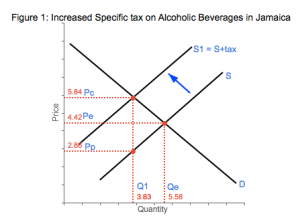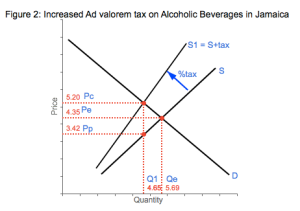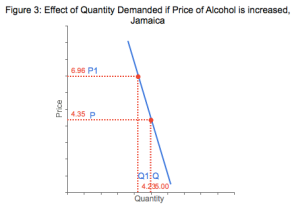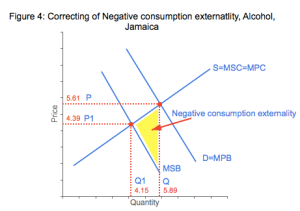Increased tax on rum will affect tourism sector — Shaw
KINGSTON, Jamaica — Opposition Spokesman on Finance and Planning, Audley Shaw, says that the increase in the special consumption tax (SCT) on alcoholic beverages will work against the competitiveness of Jamaica’s tourism industry, which will be hard hit from the taxes.
“We must bear in mind that the tourism industry in Jamaica, as it is with so many destinations, is highly competitive, and this sharp increase in the cost of alcoholic beverages to the trade will drive a further blow to the industry’s ability to be competitive,” Shaw told the House of Representatives Tuesday, as he spoke in the 2014/15 budget debate.
“One company alone will see a crushing $2 million hit on its ability to remain competitive. This is serious,” the opposition spokesman added.
The proposed tax on alcohol moves the SCT on alcoholic beverages from $700 per litre to $1,120 per litre. Specifically, the rate for White Overproof will move from $960 per litre of pure alcohol to $1,120 per litre of pure alcohol.
Shaw noted that, as minister of finance, he had exempted white rum from the regime introduced in 2010, which amended the taxation of alcoholic beverages from an ad valorem rate of 30 per cent to a specific rate per litre of pure alcohol.
“I exempted white rum from this regime to protect the local white rum industry,” Shaw noted, pointing out that in 2012 the current government amended that regime to provide for white rum to be taxed at $960 per litre of pure alcohol.
He said that the move resulted in a reduction in sales of white rum, after a 230-260 per cent increase in the tax intake on white rum and virtually doubled the price of one drink.
http://www.jamaicaobserver.com/news/Increased-tax-on-rum-will-affect-tourism-sector—Shaw
——————————————————————————
Title of extract : Increased tax on rum will affect tourism sector – Shaw
Source of extract : Jamaican Observer
Date of extract : 23rd April 2014
Word count : 713 words
Date the commentary was written : 23rdMay 2014
Section of the syllabus to which the commentary relates: Section Microeconomics
Candidate name : Saskia Stomph
—————————
Following a decrease in the sales of white-rum due to a government amendment in 2010, Jamaica has recently been hit by a sharp increase in the special consumption tax (a.k.a. a “vice tax”), an excise tax applied to a specific class of good, on alcoholic beverages such as white-rum. Audley Shaw, Jamaican minister of finance, however stated in the 2014/15-budget debate, that this will not simply have a positive effect on government tax revenue, the income gained by governments through taxation, but will also have an extremely negative effect on the Jamaican tourism industry.
In Figure 1 & 2 below, it is illustrated the effect an increase an excise tax, an indirect form of taxation, will have on the total government tax revenue. As SCT (special consumption tax) can be both specific, a specific amount of tax per unit of the good or service sold, and ad valorem taxes, a fixed percentage of the price of the good or service, both graphs will be shown. Nevertheless, since the answer derived from “(Pc-Pp)xQ1” (equation for government revenue), is the same for both specific and ad valorem tax, there will be no difference in government revenue. So, as seen in Figure 1, an increase in tax causes a leftward shift in the supply curve, leading to an equilibrium shift, resulting in a higher price and lower quantity. Also, in Figure 2, it is shown that similarly to Figure 1, an increase in tax leads to a leftward shift in supply, leading to a change in the equilibrium, increased prices and decreased quantity. Ultimately, an increase in tax only results in the Government gaining from these changes, as they now have a greater tax revenue, whereas all other stakeholders, individuals or groups who have an interest in something and are affected by it, are worse off.
Nevertheless, as Shaw stated, this increase in tax will have a drastic negative effect on the Jamaican tourism industry, which as mentioned in the debate is highly competitive and “this sharp increase in the cost of alcoholic beverages to the trade will drive a further blow the industry’s ability to be competitive”. So now that the price of one drink has approximately been doubled, leading to a blow in one of Jamaica’s biggest industries, Tourism. This meaning, that tourists are less likely to come to Jamaica, and rather go to a country where alcohol is cheaper. Also, since competition is so high, and there are multiple cheaper substitute goods, a good with a positive price elasticity of demand, the Jamaican economy would be hit hard by this extreme tax increase, resulting in a decrease in revenue. However, one could argue that as alcohol is an inelastic good, when a 1% change in the price of a good or service has less than a 1% change in the quantity demanded for a good or service and thus, relatively unresponsive, there should not be a great change in demand and hence government revenue if the price of alcohol were to be increased. This can be seen in Figure 3 below. The large increase in price from P to P1, leads to a relatively small decrease in quantity, (Q-Q1), this of course being due to the inelastic demand of alcohol.
On the other hand, as seen in Figure 4 below, using a market based policy, of imposing a tax to correct negative consumption externalities, the consumption of good or service affecting third parties, can however benefit the Jamaican economy. Therefore, to reduce this, a tax could be imposed, leading to a leftward shift in the D=MPB curve, narrowing the gap between MSB and hence decreasing the negative externality.
Overall, one could say that an increase in excise tax on alcoholic beverages in Jamaica can boost government revenue and reduce any negative consumption externality. Nevertheless, one could also consider that due to this sharp increase in tax, the Jamaican tourist industry could suffer due to its competitiveness and hence decrease the economy’s revenue. However, since policies such as taxes are not always effective, a change in the economy is not necessarily certain. In conclusion, even though an affect is quite certain, it is not completely certain and this topic can therefore remain open to discussion and debate, as such policies are often very controversial.




